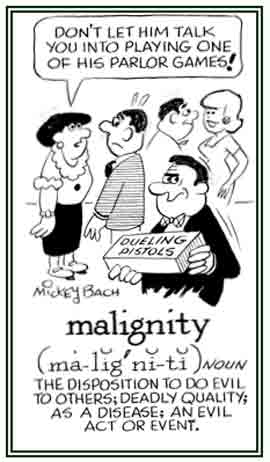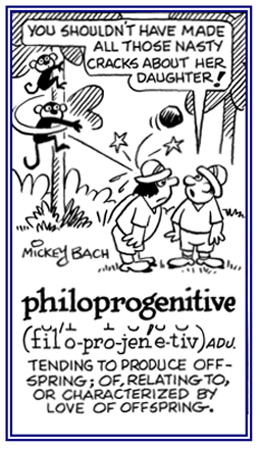genus, genesis-, -gen, -gene, -genesis, -genetic, -genic, -geny, -genous
(Latin: birth, beget; descent, origin, creation, inception, beginning, race, sort; kind, class)
malignant (adjective), more malignant, most malignant
1. Pertaining to a disease that is characterized by extreme virulence and is exceptionally contagious or infectious: As a patient, Leroy was placed in the isolation ward as a result of the extremely malignant nature of his lung infection.
2. A reference to the tendency of becoming worse and the resistance to medical treatment; pertaining to cancerous development: Given the malignant nature of the growth in the Bill's stomach, the doctor was recommending radical surgery.
3. Relating to or referring to a threat to produce death; harmful; virulent: The term malignant primarily describes such ailments as a tumor which spreads from its original location to affect other areas of the body with potentially life-threatening results.
4. Characterized by an intense ill-will; keenly desirous of the suffering or misfortune of others generally: The dictator had a powerful and malignant influence on the lives of the citizens of his nation and that's why so many of them fled to neighboring countries.
2. A reference to the tendency of becoming worse and the resistance to medical treatment; pertaining to cancerous development: Given the malignant nature of the growth in the Bill's stomach, the doctor was recommending radical surgery.
3. Relating to or referring to a threat to produce death; harmful; virulent: The term malignant primarily describes such ailments as a tumor which spreads from its original location to affect other areas of the body with potentially life-threatening results.
4. Characterized by an intense ill-will; keenly desirous of the suffering or misfortune of others generally: The dictator had a powerful and malignant influence on the lives of the citizens of his nation and that's why so many of them fled to neighboring countries.
malignantly (adverb), more malignantly, most malignantly
Characteristic of acting or behaving in a manner that is evil, harmful, or disdainful: The visitor's malignantly sarcastic humor was offensive to Zara's family and friends, which caused them to be very unhappy about the whole situation.
1. Wicked and deep-rooted ill-will; an intense and persistent desire to cause suffering to other people: The malignities between the two families stretched back several generations and no one really knew what the hatred was all about.
2. A disease or an injury that is deadly or destructive: The doctor was sure that the malignity which Joan had was potentially fatal if it was not treated immediately.
3. Qualities; such as, cattiness, spitefulness, or carrying a grudge: The old man, who lived in the run-down house, shouted at everyone who walked by, seemingly unaware of the malignity that he was hollering at them.

© ALL rights are reserved.
Go to this Word A Day Revisited Index
2. A disease or an injury that is deadly or destructive: The doctor was sure that the malignity which Joan had was potentially fatal if it was not treated immediately.
3. Qualities; such as, cattiness, spitefulness, or carrying a grudge: The old man, who lived in the run-down house, shouted at everyone who walked by, seemingly unaware of the malignity that he was hollering at them.

Go to this Word A Day Revisited Index
so you can see more of Mickey Bach's cartoons.
A mixing of ethnic groups; such as, when people of different races live together and have children: Mark was a child of miscegenation because his mother was German and his father was African American and now he is a German citizen working as a construction engineer.
ontogenesis
ontogenetic
ontogenize
parthenogenesis
1. A form of reproduction in which an unfertilized egg develops into a new individual, occurring commonly among insects and certain other arthropods.
2. Reproduction without concourse of opposite sexes or union of sexual elements.
3. Reproduction from a gamete without fertilization, occurring most commonly in invertebrates and lower plants. Formerly also: asexual reproduction, as by fission or budding.
4. Also see tychoparthenogenesis in this unit.
2. Reproduction without concourse of opposite sexes or union of sexual elements.
3. Reproduction from a gamete without fertilization, occurring most commonly in invertebrates and lower plants. Formerly also: asexual reproduction, as by fission or budding.
4. Also see tychoparthenogenesis in this unit.
parthenogenetic, parthenogenous, parthenogeny
1. In biology, pertaining to, of the nature of, or characterized by parthenogenesis; reproducing by parthenogenesis.
2. Born of a virgin; as a parthenogenetic deity.
2. Born of a virgin; as a parthenogenetic deity.
The origin and developmental course of a disease or mental disorder: When Susan asked the doctor how she got the measles, she asked about the pathogenesis of that illness which was caused by a virus accompanied or succeeded by a high fever and red spots all over her body.
philoprogenitive (adjective), more philoprogenitive, most philoprogenitive
1. Pertaining to being procreative, producing offspring; prolific: Judy’s philoprogenitive cat gives birth to litters of kittens every year.
2. Related to loving one's own offspring or all children in general: Sally didn't have any children of her own, however as a philoprogenitive aunt, she had her sister's children in her home as often as possible after school was over in the afternoon.

© ALL rights are reserved.
Go to this Word A Day Revisited Index
2. Related to loving one's own offspring or all children in general: Sally didn't have any children of her own, however as a philoprogenitive aunt, she had her sister's children in her home as often as possible after school was over in the afternoon.

Go to this Word A Day Revisited Index
so you can see more of Mickey Bach's cartoons.
photogenic
1. Produced by light, as photogenic epilepsy.
2. Producing or emitting light; phosphorescent.
2. Producing or emitting light; phosphorescent.
phylogenesis
phylogenetic
phylogenetically


